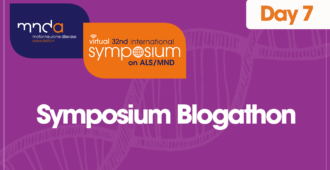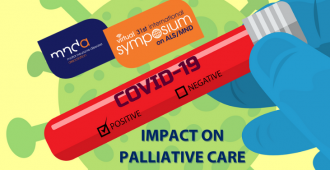This blog is part of the ‘Points from Perth’ collection of articles, where you can read about the content from some of the talks and posters presented at the 30th International Symposium on ALS/MND in Perth. All presentations have a code beginning with ‘C’ followed by a number (e.g. C50). This will help you locate the specific abstract mentioned throughout the post in the official abstract book.
Written by Rachel Boothman
The impact of caring for people with MND was the focus of several presentations in Session 5B at the Symposium.
Carers of people living with MND face many challenges from diagnosis to bereavement and the way the diagnosis is delivered can impact on the carer journey. Evidence presented shows emotion, empathy and the time dedicated to giving the diagnosis need to be worked on. Three important factors which contribute to the support of carers were explored. Assessing and addressing carer’s needs can be significant, particularly knowing what to expect, who to contact, what equipment can help and how to self-care. A specific tool to identify carer needs can be helpful. Education for health professionals is also significant and the palliative approach should be adopted by all, not just specialist practitioners. An education programme for health professionals in Western Australia ‘Caring for people with MND’ has proved successful at improving knowledge and confidence levels. Finally, the role of Associations was highlighted as important and it was suggested immediate referral should happen at diagnosis. The benefits include being visited at home, personal contact and a proactive approach. Take home message: Social networks and models of support have the highest impact and need to come first (C52) S Aoun.
Although there is a better understanding of how MND effects children and young people, there is much more to be done in this field. M Kavanaugh (C53) shared an overview of projects involving young carers over the past 10 years, and explained children as young as six are providing care for family members, often with no training or support. This includes tasks such as bathing, moving and handling and administering medication. A pilot training programme which supports young carers in the USA (YCARE) has shown improved self-efficacy, confidence and quality of care in those who have participated. The day long event is run by health professionals including occupational therapists and physiotherapists and supports caregiving tasks including use of respiratory equipment and transferring loved ones safely. Watch Melinda sum up her research in a video interview from the Symposium here.

Few studies have considered the impact of MND on carers who have lost loved ones and researchers in Ireland have added to knowledge in this area. Bereaved carers completed measures of anxiety, depression, care giver burden, quality of life and palliative care treatment to look at the direct and indirect effect these had. Results showed palliative care at home and involvement of a multidisciplinary team in respite care were associated to lower burden for carers. The individual experiences of carers are also significant and factors which influence this include resilience, coping style, personality and support networks (C54) M Galvin.
When caring for people with MND, maintaining and enhancing quality of life is often a goal for treatment. Researchers in Ireland carried out a study of ‘lived experience’ to understand what contributes to quality of life. People with MND and their carers were interviewed separately at home on three different occasions, providing feedback on a range of factors including clinical features, psychological distress and quality of life. This included questions such as ‘What are the most important aspects of your life?’ ‘Why are they important?’ and ‘How are they for you at the moment?’. Results indicated quality of life was higher for people with MND than it was for their carers. Family, hobbies and social activities were the main contributors to quality of life (C55) M Galvin.
Find out more about the topics discussed in Perth on our Periodic table of Symposium at www.mndassociation.org/symplive.




